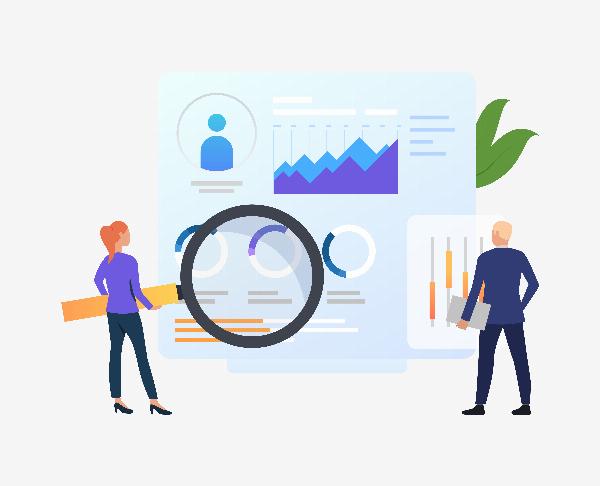Data-Driven Recruitment: Leveraging Analytics for Better Hiring Decisions

Strong 8k brings an ultra-HD IPTV experience to your living room and your pocket.
Recruitment is no longer just about filling positions; it's about finding the right talent that aligns with a company's goals and culture. Traditional hiring methods are becoming increasingly obsolete in today's competitive job market. Enter data-driven recruitment – a strategic approach that uses analytics to make better hiring decisions. By leveraging data, companies can improve their recruitment processes, reduce time-to-hire, and enhance the overall quality of hires. This article delves into how data-driven recruitment transforms the hiring landscape and how organizations can implement these strategies effectively.
Understanding Data-Driven Recruitment
Data-driven recruitment involves using data and analytics to inform and enhance recruitment strategies. It encompasses various stages of the hiring process, from sourcing and screening candidates to making hiring decisions and onboarding new employees. By analyzing data from multiple sources, recruiters can gain insights into candidate behaviors, preferences, and performance, leading to more informed and effective hiring decisions.
The Benefits of Data-Driven Recruitment
1. Improved Quality of Hire
Data analytics helps identify the skills and attributes most predictive of success in a role.
Recruiters can use historical data to benchmark candidates against top performers.
2. Faster Time-to-Hire
Automation of repetitive tasks like resume screening accelerates the recruitment process.
Predictive analytics can identify candidates more likely to accept job offers, reducing the time spent on negotiations.
3. Enhanced Candidate Experience
Data-driven insights allow for personalized communication and engagement with candidates.
Predictive models can tailor the recruitment process to individual candidate preferences.
4. Cost Efficiency
By optimizing sourcing channels based on data, companies can reduce recruitment costs.
Data-driven decisions minimize the risk of bad hires, which can be costly to the organization.
5. Diversity and Inclusion
Analytics can help identify recruitment bias and suggest strategies for promoting diversity.
Data-driven recruitment ensures a fairer evaluation of candidates, fostering a more inclusive workforce.
Key Metrics in Data-Driven Recruitment
- To leverage data effectively, recruiters need to focus on several key metrics:
- Time-to-Fill: The average time it takes to fill a position, from job posting to offer acceptance.
- Quality of Hire: A measure of a new hire's value to the company, often assessed through performance metrics and retention rates.
- Source of Hire: Identifying which recruitment channels yield the best candidates.
- Candidate Experience: Gauging candidate satisfaction with the recruitment process through surveys and feedback.
- Diversity Metrics: Tracking the demographic diversity of candidates and hires to ensure inclusivity.
Implementing Data-Driven Recruitment Strategies
1. Sourcing and Attracting Candidates
Utilize Social Media Analytics: Platforms like LinkedIn, Facebook, and Twitter provide valuable data on candidate behaviors and preferences.
Leverage Employee Referrals: Analyze past referral data to identify trends and improve the effectiveness of referral programs.
Optimize Job Descriptions: Use A/B testing to determine which job descriptions attract the most qualified candidates.
2. Screening and Assessing Candidates
Automate Resume Screening: Implement recruitment tools in India to screen resumes for relevant skills and experience quickly.
Use Predictive Analytics: Develop models based on historical data and performance indicators to predict candidate success.
Conduct Structured Interviews: Standardize interview questions and evaluate responses using data-driven scoring systems.
3. Decision-Making and Hiring
Data-Driven Decision Making: Use data insights to inform hiring decisions, reducing reliance on gut feeling.
Collaborative Hiring: Share candidate data and insights with hiring managers and team members for more collaborative decision-making.
Benchmarking: Compare candidates against top performers and industry standards to ensure high-quality hires.
4. Onboarding and Retention
Personalized Onboarding: Use data to tailor onboarding programs to the needs of individual hires.
Monitor Early Performance: Track new hires' performance and engagement during the initial months to identify potential issues early.
Continuous Feedback: Implement ongoing feedback and performance-tracking systems to support employee development and retention.
Challenges and Solutions in Data-Driven Recruitment
While data-driven recruitment offers numerous benefits, it also presents certain challenges:
- Data Quality: Ensuring the accuracy and completeness of data is crucial for reliable insights.
- Solution: Regular data audits and using robust data management tools.
- Privacy Concerns: Handling candidate data responsibly and ensuring compliance with data protection regulations.
- Solution: Implement strict data privacy policies and obtain consent from candidates.
- Resistance to Change: Encouraging recruiters and hiring managers to adopt data-driven practices can be challenging.
- Solution: Provide training and demonstrate the tangible benefits of data-driven recruitment.
- Technology Integration: Integrating various recruitment technologies and platforms can be complex.
- Solution: Choose interoperable systems and invest in integration solutions.
Future Trends in Data-Driven Recruitment
- Artificial Intelligence and Machine Learning: AI will continue to play a significant role in automating and enhancing various aspects of recruitment.
- Predictive Analytics: More sophisticated predictive models will emerge, providing deeper insights into candidate success and retention.
- Advanced Talent Analytics: Advanced analytics will become more prevalent in understanding talent trends and workforce dynamics.
- Integration with HR Systems: Seamless integration of recruitment data with other HR systems will provide a holistic view of the workforce.
Conclusion
Data-driven recruitment is revolutionizing how organizations attract, assess, and hire talent. By leveraging data and analytics, companies can make more informed decisions, improve the quality of hires, and enhance overall recruitment efficiency. Implementing a data-driven approach requires investment in technology, training, and continuous improvement, but the benefits outweigh the challenges. As the recruitment landscape evolves, embracing data-driven strategies will be key to staying competitive and building a strong, dynamic workforce.
Note: IndiBlogHub features both user-submitted and editorial content. We do not verify third-party contributions. Read our Disclaimer and Privacy Policyfor details.


